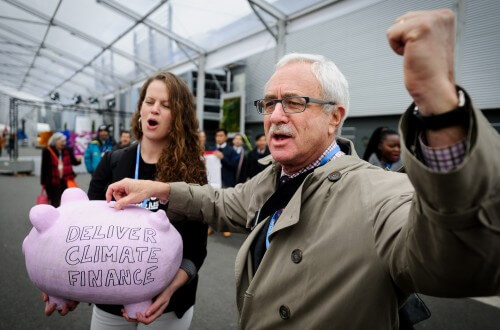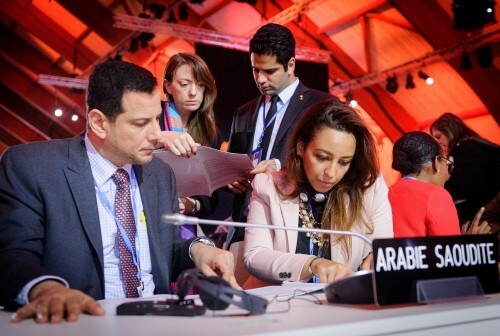A reading of the draft of the Paris Agreement, which should be signed today (Friday) at noon, shows that currently there are more question marks than agreements among the participating countries. Will we get a historic agreement, or just another toothless document?

Thursday
The representatives of the countries of the world are in the last line of the race to reach an agreement that will save the world. In less than 24 hours, the climate change treaty should be signed in Paris. The purpose of the conference, as I recall, was to stop the continued warming of the earth, or at least to make sure that it does not warm up by more than two degrees - this is to prevent irreversible damage to the life and nature that exist on it.
Will the conference succeed in achieving its goal? Depends on who you ask. "The current commitments of the countries to reduce greenhouse gas emissions may lead to a further warming of three degrees in the temperature of the earth", says Muhammad Adew, a Kenyan environmental activist from the Christian Aid organization, who spoke at the official press conference of the conference held today (Thursday) at noon. Contrary to Advo, there are many optimistic voices coming from Paris today.
Yesterday (Wednesday) the draft of the agreement that should come out of Paris was published. It is a 23-page document, which is worded in a rather strange way: most of the draft is worded in the structure of an American test - three different versions for each section, from which the representatives of the countries have to decide on their preferred wording by the moment of signing, at noon on Friday.
From reading the draft, it seems that much is hidden from the agreed upon. So, for example, it is not clear whether the goal of the emerging agreement will be to prevent global warming by 2 degrees Celsius or 1.5 degrees. Or maybe all the answers are correct. The differences between the versions are extremely significant: preventing warming of 1.5 degrees is a more ambitious goal that many countries (such as Canada, Norway and many island countries, mainly in the third world) pushed for during the conference. The problem is that the optimistic goal is not really accompanied by examples of practical actions for implementation.
According to the draft agreement, all signatories undertake to implement their contribution to reducing greenhouse gas emissions, or at least to try. It is agreed that developed countries should act as quickly as possible to reduce their emissions by 70 percent, while developing countries will be given an extension. or not. The point on which there is a serious dispute is whether the developed countries will reduce emissions in an absolute way while developing countries will reduce with sustainable economic development, or if the efforts will be equal for all. Another dispute is whether the financing for reducing emissions by the rich countries will be defined in advance, or whether it will rely on the good will of the countries to contribute to the issue.
However, despite all the controversy and misunderstandings, the press conference held today conveyed a message of hope: all countries agree to agree, there is good will and the fact that 184 countries have submitted a commitment to reduce their greenhouse gas emissions is an impressive achievement. Another issue that everyone seems to agree on at the conference is that more conferences are needed. According to what is evident, the participating countries will return to the discussion table in two years, to report on what they have achieved and to update their goals, in the hope that they will be too ambitious for a convention, this also following the development of technology and the improvement of administrative mechanisms.
One of the hot topics that still needs to be decided on in the next day or so is who pays for all of this. That is, who undertakes to pay for reducing emissions, how much they will pay and when. The "Green Climate Fund" established back in 2010 was designed to support projects, programs and policies to reduce emissions in developing countries. So far, 10.2 billion dollars have been collected in the fund, but apparently this amount will only be enough for the next five years, until 2020. In order for developing countries to be able to follow the green path, they need to receive confirmation that the money will be there to support them. The significance of this step is enormous: without an agreement on how to finance the reduction of emissions, the agreement that will be signed in Paris will basically have no actual teeth.
Another charged economic issue is who will support the losses and damages of the countries that suffer from natural disasters that will be caused by climate change. Hundreds of thousands of people around the world have lost their homes, land and property in recent years as a result of climate change. The countries most sensitive to these phenomena, small islands for example, are usually the least responsible for the global warming they suffer from. According to the emerging agreement, the countries participating in the Paris conference are supposed to establish an international body that will be responsible for dealing with refugees and immigrants as a result of climate change and develop tools that will deal with all the damage that man-made climate change will cause.

Saudi Arabia's representatives to the conference. Stick sticks in the wheels. Photo: cop paris
Official speakers and publications did not point accusing fingers at the countries that are thwarting the understandings, but apparently Saudi Arabia is one of the countries that put a lot of sticks in the wheels of the emerging agreement. Indeed, the oil giant submitted a document in preparation for the conference in which it offers to participate in efforts to find alternative energy sources, but without any quantitative commitment. Not much more than lip balm.
Another problem is the issue of enforcement. The agreement to be signed tomorrow will be legally binding, under international law, but without an enforcement mechanism. The real actions that will be done in the field will be carried out under the supervision of the countries themselves and subject to their free will. In Paris, there is a lot of talk about transparency, but from past experience we know that under transparency we mostly hear about the successes - and less about the failures.
The important question is not whether there will be an agreement, but whether a popular agreement will be signed that many are ready to sign, but does not hold water, or an effective agreement that will truly give hope for the future. We will probably get the answer tomorrow at noon.
